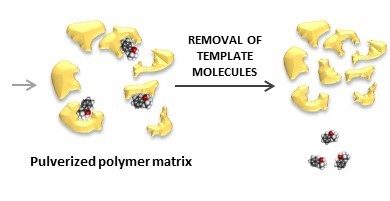Technology
MipSalus has invented a platform technology that can be used to develop multiple medicinal products. The platform technology is based on a well-established technology, Molecular Imprinted Polymers.
Molecular Imprinted Polymers, or MIPs, is a technology that produces antibody-like binding sites in a synthetic polymer. Due to the binding sites, MIP particles can be used to bind molecules like amino acids to which some people are unable to metabolize and then transport them out of the body non-systemically via faeces.
The antibody-like binding sites are the result of a process in which template molecules are added to a polymer matrix which then builds around the molecules. These are identical to the molecules which as they accumulate in the body cause a condition requiring treatment.
In the first step of the production process, a solution of a specific template molecule and selected functional monomers is produced, and the monomers organize around the template molecule. Subsequently, polymerization is initiated, meaning that the monomers and template molecules are forced together to form a structure of molecules: a polymer.


In the next part of the process, the polymer is mechanically down-sized into small MIP particles and washed in order to remove the template molecules. This leaves cavities in the MIP particles which are complementary to the physical and chemical characteristics of the template molecule. These cavities function as binding sites and due to their high specificity, the MIP particles are capable of interacting with the template molecule, while other molecules closely related in structure are left untouched.
Based on proprietary technology covered by various patent families comprising concept, production, and usage, MipSalus has made significant improvements to the general MIPs technology. These improvements expand the potential of the technology significantly and enable its use in various medical applications.
